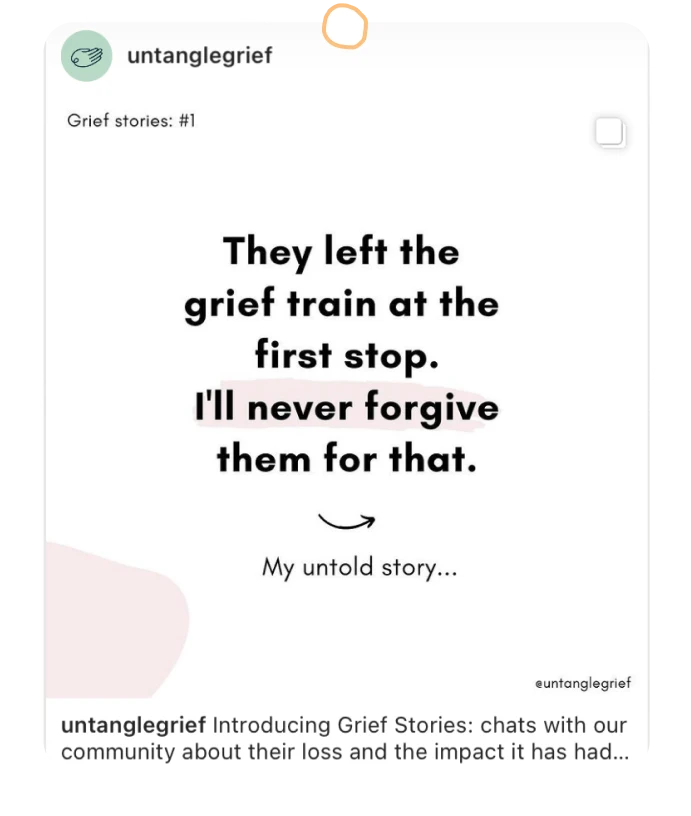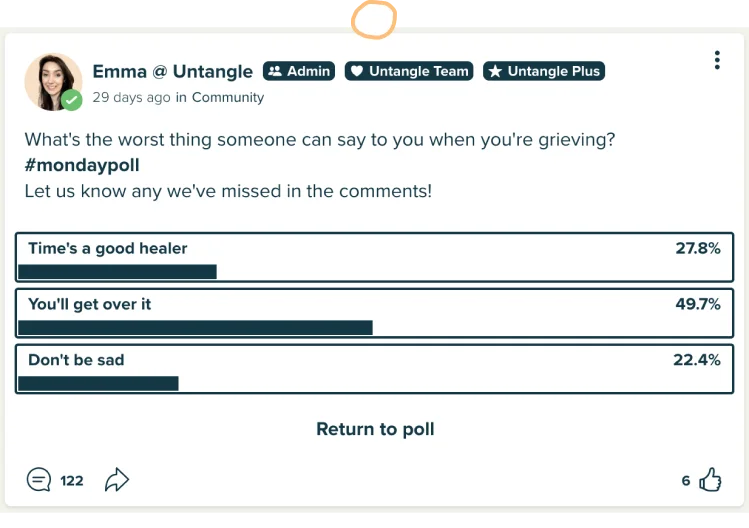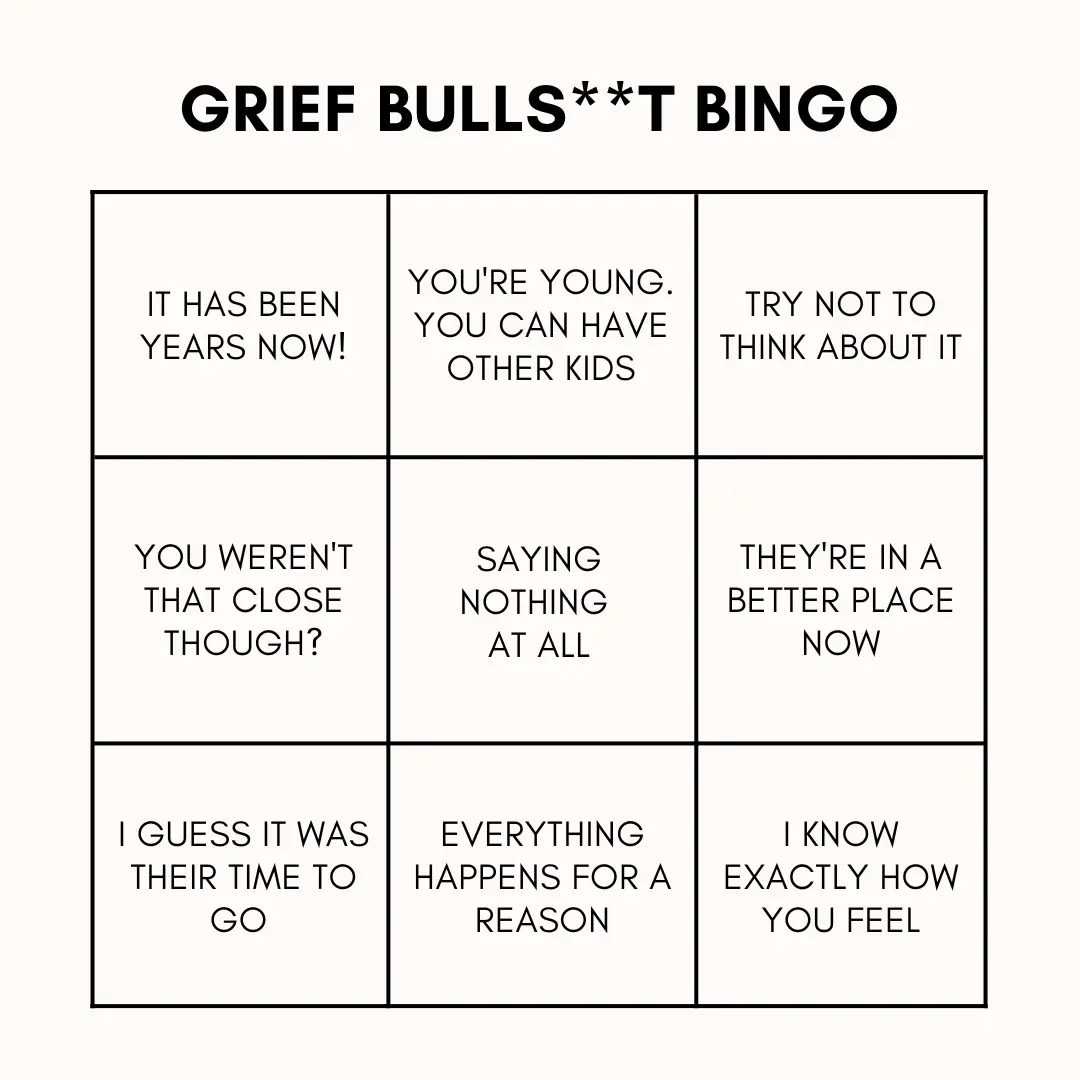Unless you’ve experienced grief, it can be hard to know what to say when someone dies. In fact, even if you’re grieving yourself, words of comfort don’t always come easily. Ultimately, it’s a sensitive and challenging time, and the pressure to say ‘just the right thing’ can be overwhelming. So here’s our guide on what to say when someone dies. We hope it helps…
Jump to section:
- Upon hearing the news of a recent loss
- After time has passed
- What not to say when someone dies
- A note on grief
What to say to someone who is grieving
First things first: it’s better to say something than say nothing at all, so don’t go silent on someone coping with grief. Radio silence can often be more hurtful than saying the ‘wrong’ words. You’re not always going to get it exactly right, but checking in just after a loss, and in the time that follows, can help your friend or family member feel a little less alone.
Upon hearing the news of a recent loss
Say things like:
“I’m so sorry for your loss/I’m so sad to hear about your loss.” – This is a simple yet meaningful way to start sympathy messages or conversations with someone who’s grieving.
“Can I do anything to help?” – The person who has recently lost will be struggling right now, so help from friends and family is more important than ever. If you can, make specific offers, such as “I’m going to the shops, can I get you anything?” or “would you like me to look after the kids today?”
“I remember when…” – If you know them, talk about the person who has died. Share a favourite memory of them with their loved ones. It could be a funny joke they once told you or a time they helped you when you needed it most.
“I’m thinking of you.” – Like “I’m sorry for your loss”, this is a simple line you can include in a text message, as it lets your friend or family member know you’re there for them when they need you.
“How are you?” – You already know the answer to this one – of course, they’re feeling terrible. However, by asking them, you’re creating an opportunity for them to open up.
Sending a card? Take a look at our advice on how to write a bereavement card, which has plenty of ideas and inspiration for writing a meaningful message.
– Join Untangle’s grief community –
After time has passed
It might feel like the early stages of grief are when your words and actions are needed the most, but grief isn’t linear, and the months and years that follow are just as important.
This is something we hear a lot in the Untangle community: although grief doesn’t disappear once the funeral is over; often, well wishes do. This lack of acknowledgement can make those grieving feel isolated and like they can’t talk honestly about how they’re feeling.

“They left the grief train after the first stop: the funeral. If I’m being truly honest, I’ll never forgive them for that.
I actually raised the fact nobody reached out over the last 4 years to a close friend. His response? ‘How are we supposed to know?…’
I personally think that’s a load of sh**.”
Ryan, Untangle’s Grief Stories, vol 1
What can you do?
Show up for them. Remember wedding and death anniversaries, birthdays and other dates of note (such as Mother’s Day or Father’s Day). It will mean so much to them. You could reach out with a card and flowers, or just a simple message on the day. Or how about offering to take them somewhere to commemorate their loved one(s)?
It’s not just special dates that matter, either. It’s easy to feel apprehensive about mentioning someone who has died – after all, are you reminding people that they’re gone? The answer to this is no: they don’t need reminding; their loved one is always on their mind. By giving them the space to talk about them, you can help them to process grief.
Say things like:
“How are you?” – This one is so important both straight after a loss as well as in the time that follows. Those who are grieving don’t always feel comfortable bringing up their sadness, so invite them to express their feelings as time goes on. Then, when they answer, really listen to what they have to say. Don’t offer solutions (unless they ask you to); instead, acknowledge their emotions and the fact that it’s hard for them.
“I just wanted to let you know that I’m thinking of you on their birthday/your anniversary/this Mother’s or Father’s Day.” – This message can apply to any important date, including a death anniversary. You may want to send a card at this time. Remain consistent with this too; don’t simply mark the many ‘firsts’, but reach out each year so they know their loved one isn’t forgotten.
“I just saw X and it made me think of the time Y…” – A message like this, any time, can mean so much to someone who is grieving. If you see a reminder of their loved one, let them know. Stories, memories and jokes are treasures to them.
– Join Untangle’s grief community –
What not to say when someone dies
We asked the Untangle community to vote on the worst things people say to those who are grieving, and most agreed that “you’ll get over it” is the hardest to hear, closely followed by “time’s a good healer”, then “don’t be sad”.

Our members also shared a few extra ‘no-nos’. So here are the things you shouldn’t say to someone who is grieving…
“At least…” – There is no ‘at least’ when someone is grieving. Their person is gone and it’s heartbreaking, so no ‘silver linings’ are going to suddenly make that feel okay.
“I know how you feel.” – Even if you’ve experienced loss, don’t try to compare your grief with someone else’s. Every experience is unique, and comparing situations can make them feel somewhat trivial.
“Don’t be sad.” – Or anything similar. Even if years have passed since the loss, telling someone that they shouldn’t be sad doesn’t achieve anything – it only makes them feel shamed or misunderstood. You might find that they talk to you less about their grief because they’re worried about being judged.
“Everything happens for a reason.” – If you’re wondering what to say when someone dies unexpectedly, avoid this line. In fact, avoid it regardless. It can be hurtful to hear, as it implies the death of a loved one was ‘meant to happen’.
“I don’t know how you’re doing this.” – Some say this can make their grief feel bigger and unmanageable. It can also make them feel isolated, unable to vocalise their true feelings, due to both perception and a knowing that others are unable to empathise.
“Time’s a good healer.” – this is predicated on grief getting easier over time. It also adds an element of pressure to feel okay with the passing of time. This is wrong. Every relationship is different; every loss is unique. Grief doesn’t just get easier because another year has passed. For more info on this, check out our stages of grief article.
“They’re in a better place now.” – While this may comfort some, depending on their religious beliefs, many say this is one of the hardest things to hear. Grieving is different across cultures, so be sure to know people’s beliefs before you make a statement like this. In other words, the use of this is not advised.
An important note on grief…
Everyone’s experience of grief is unique, so while these tips are meant to help you comfort your loved one, you may find the support they need looks different to the words on this page. That’s okay – keep the lines of communication open and accept that, sometimes, you might just say the wrong thing. As long as your intentions are good and you really listen to your loved one, you can help them through their most difficult times.
And, if you’re really unsure, keep your words simple, don’t try to hurry them through the stages of grief, and don’t try to fix things. Showing up and letting them know you care is the most important thing of all.
Lastly, do recommend a grief community – we have dedicated support spaces that aim to connect people over shared experiences of loss.
For more advice and to connect with others who share a similar experience of loss, download the Untangle Grief app.
Do let us know if there’s anything you feel should be added to this ‘what to say to someone who is grieving’ guide – the more useful advice, the better.




